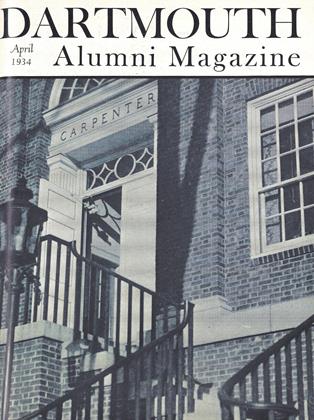ROBBIE CAME UP from Springfield once or twice a year to buy old clothes of those who weren't wearing them at the moment. He is pictured above, standing by the Chapel, a favorite and rewarding location. The white sweater might have been Dick Sisk's. The trousers are obviously professorial. His successors are a dour lot, lacking his cheery smile and persuasive tone. Another annual visitor, recently returned after many years in Italy, was John Spaghett; who spread his plaster wares on the steps of Webster by day, and trudged with his basket to fraternity houses and dorms by night to hold raffles, and remember hundreds of names and faces, and stutter, while his round face became redder and shinier with excitement. Sailor Scotty was a third. He would gather a crowd in the Commons living room, strip to the waist, and perform his contortionist act, throwing "hups, sojers, and stomjie" in and out of joint at will. He could vary by many inches the length of his arms, legs, neck, and torso. Then there were the old man who taught card tricks, and the phrenologist.
Best known of local characters were Lon Gove and Jim Haggerty, whose memorials have already been better written than I can hope to write them. Lon never changed in appearance or manner during the last twenty or thirty years of service at the Inn desk—always suave, with a supercultured accent, always smoking Sweet Caps, and always ready to bet on Yale oyer Harvard, though he never wore the bright blue paper suit that the coaches gave him. Jim Haggerty was known by sight to everyone who ever waved an order slip in the air at the Grill, and known intimately and beloved by hundreds of boys who worked for him. Apparently a sour old cross-patch, his kindliness and sense of humor showed in many ways to those who knew him, and his long collect telegrams to Harry Hillman, giving detailed advice on the conduct of track meets, were famous.
Of the other immortals who catered to the inner man in Commons, restaurant, and club only Mary Smalley remains. Hal Brown is gone, Mrs. Bagley and both Ed and Kitty Bridge, John Aulis, Phil Trachier—all are supervising more celestial meals. Henry Pelton, whose peanut wagon dominated the corner by the trough, now presides at the College tap room, and Scotty, long since free of his restaurant, runs the Little Store.
A few years back old Andy—ninety pounds of grit—cursed the students and urged his team out the Lyme Road for the last time; though Nat Woodard still stables his horse, one of the few left in the village, in Gil Frost's barn. Joe Truman (no longer an Alpha Delta Phi) still presides over the destinies of the C & G basement and his brother Charley still whistles and runs his ministrel show in Norwich, but Sargent no longer sells cider, sweet or hard, Jake Bond is gone, and Professor Nelf and his riding academylasted only a brief season before they disappeared.
Many of the old familiar faces still grace Main Street—George McCarty, Tony, Dad Bowman, Hughie Croall, Ed Boyle, Buster Brown, Ed Dewey—but many more have departed for other towns, other lands, other worlds, their places filled—adequately?by a parvenu throng. And by the way, what has become of Henry Isaacs' establishment in Greenfield?
Jim Haggerty, grumpy at the Grill, and Robbie, cheerful at the chapel
 View Full Issue
View Full Issue
More From This Issue
-
 Class Notes
Class NotesClass of 1918
April 1934 By Allan C. Gottschaldt -
 Article
ArticleHANOVER BROWSING
April 1934 By Rees H. Bowen -
 Class Notes
Class NotesClass of 1910
April 1934 By Harold P. Hinman -
 Class Notes
Class NotesClass of 1908
April 1934 By Laurence W. Griswold -
 Class Notes
Class NotesClass of 1930
April 1934 By Albert I. Dickerson -
 Class Notes
Class NotesClass of 1923
April 1934 By John C. Allen







